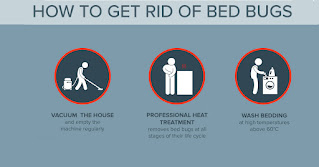Dealing with a bed bug infestation can be stressful, but proper preparation before extermination is essential to ensure the process is effective. If you're scheduled for professional bed bug extermination, follow these eight steps to prepare your home and help maximize the success of the treatment.
1. Understand the Treatment Plan
Ask your exterminator for a detailed explanation of the process, including the type of treatment (chemical, heat, or other methods). Knowing what to expect will help you prepare effectively and ensure safety precautions are followed.
2. Declutter Your Living Space
Bed bugs love hiding in clutter. Clear out unnecessary items from your bedroom and other affected areas. However, don't move belongings to another room, as this could spread the infestation.
3. Launder All Fabrics
Wash all bedding, curtains, clothing, and lines in hot water and dry them on high heat. Heat is one of the most effective ways to kill bedbugs and their eggs. Store clean items in sealed plastic bags or bins until the extermination is complete.
4. Vacuum Thoroughly
Vacuum the entire home, paying special attention to cracks, baseboards, mattresses, and furniture. Empty the vacuum bag or container immediately into a sealed bag and dispose of it outside.
5. Remove or Protect Infested Items
Mattresses, box springs, and upholstered furniture are prime hiding spots for bed bugs. Remove encasements or protect these items using certified bed bug-proof covers if recommended by your exterminator.
6. Move Furniture Away from Walls
Pull furniture, beds, and other items at least 18 inches away from the walls to give exterminators easy access to the perimeter of the room. This step ensures that every hiding spot can be treated.
7. Empty and Secure Drawers and Closets
Remove clothing, books, toys, and other items from closets, drawers, and shelves. These items can harbor bedbugs and should be treated or washed. Place cleaned items in sealed plastic bags
8. Plan to Leave Your Home
Extermination treatments often require you to vacate your home for several hours to ensure safety. Make arrangements for pets and household members to stay elsewhere during the process.
Post-Treatment Tips
After extermination, wait for the all-clear from your exterminator before re-entering your home. Continue monitoring for signs of beg bugs and follow any additional recommendations provided.
Preparing for bed bug extermination can feel overwhelming, but following these steps will help ensure the treatment is thorough and effective, allowing you to regain peace of mind in your home.
#pestcontrol #pestcontrolservices #bedbugsextermination #bedbugscontrol




.jpg)









